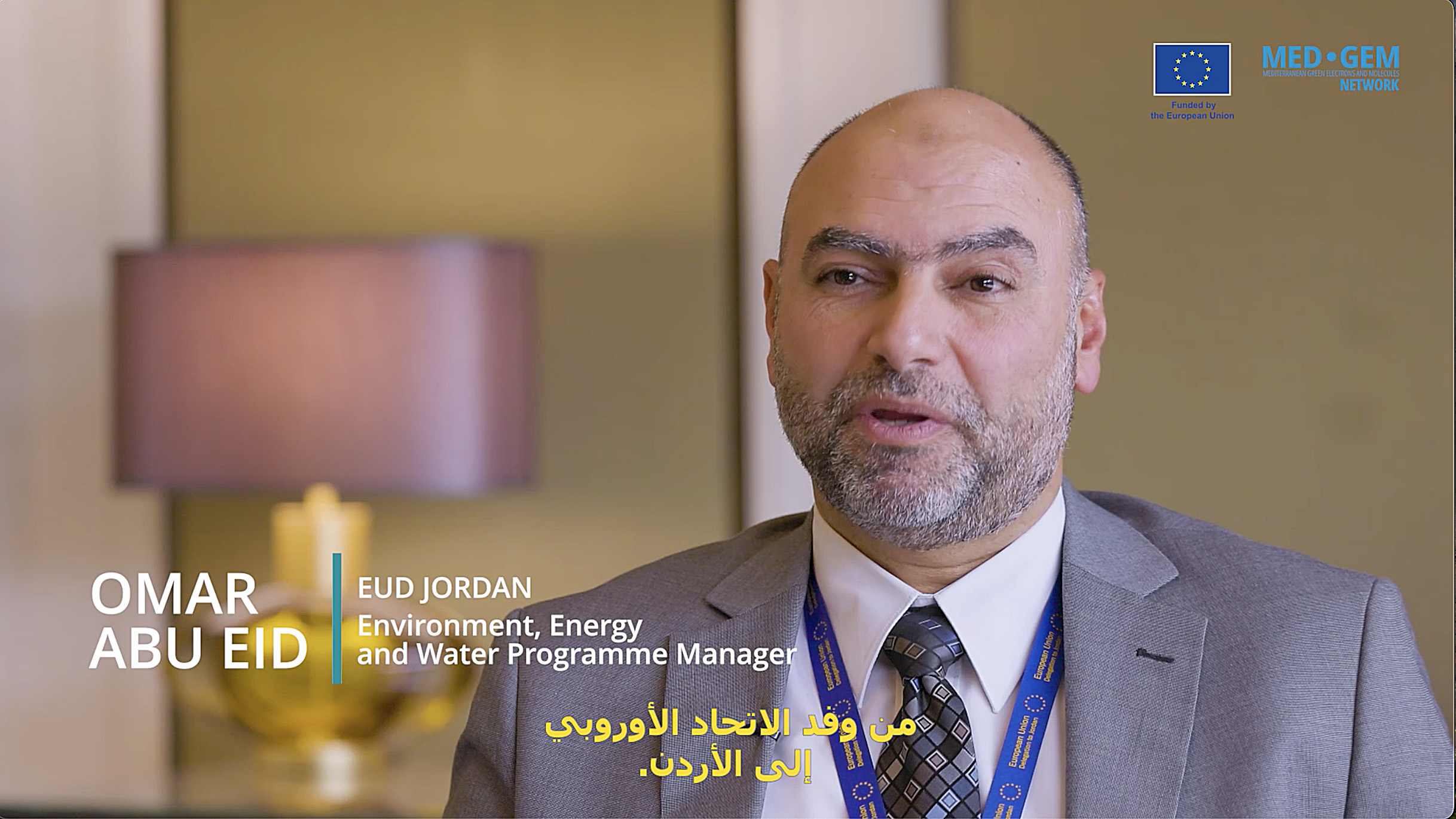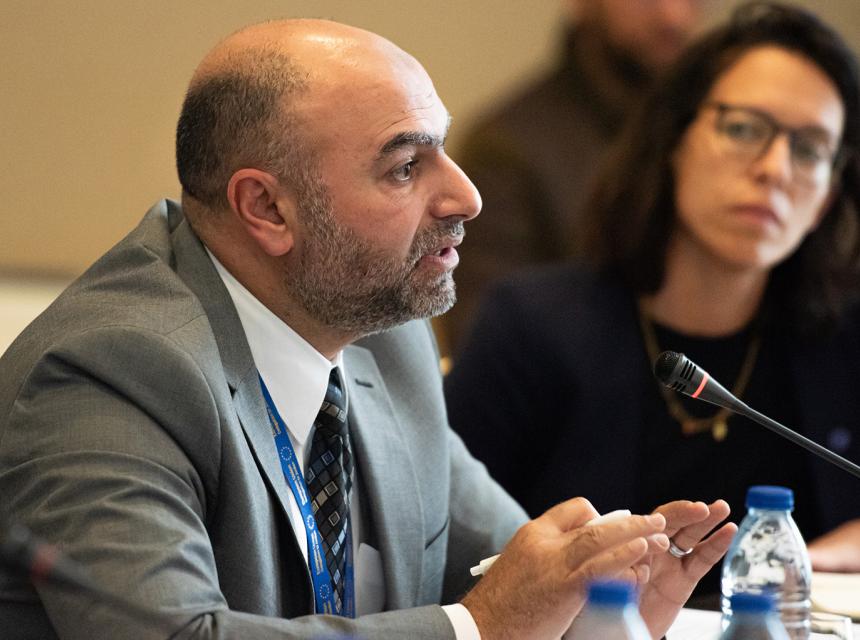EU-Jordan Partnership, A Strong Alliance for Green Energy Development: Interview with Omar Abu Eid
In an exclusive interview with MED-GEM Network late November 2023 in Amman, Omar Abu Eid, the program manager for Energy, Environment, and Climate Change at the European Union delegation to Jordan shares his vision about the EU-Jordan Strong Partnership, for Green Energy Development.
In this long recorded and podcasted interview, Omar Abu Eid, has accentuated the strong partnership between the EU and Jordan in developing green energy. The collaboration extends back 15-20 years, focusing on areas such as the integration of energy networks across the Mediterranean. Jordan's unique geopolitical position and potential for green energy development, especially in solar and wind power, play significant roles in the partnership. The EU has provided both regional and bilateral support programs, including technical assistance, strategic support, and legal and regulatory approximation. The partnership has resulted in an increase in Jordan's renewable energy production from 1% in 2014 to 27% by the end of 2022. The EU's programs have directly reached people with installations of solar water pumps and PV rooftop systems, and have enhanced collaboration and public-private partnerships in Jordan.
The European Union (EU) has significantly contributed to the development of necessary infrastructure for the transition to renewable energy in Jordan. This has been achieved through collaboration with financing institutions such as the European Investment Bank, EBRD, AFD and KfW, and the Jordanian government. Specific initiatives have been undertaken to enhance the national grid, particularly in the southern regions where most of the current solar and wind energy generation occurs. The EU has provided incentives for both public and private stakeholders to invest in infrastructure upgrades to facilitate the integration of renewable energy into the grid.
The EU also plans to further promote green energy in Jordan by updating the 2020/2030 strategy and exploring different scenarios. The vision includes renewable energy, storage, green hydrogen, and sustainable mobility, with an emphasis on interconnections and integration within the region. The EU also commends the voluntary efforts of Jordanian citizens in shifting towards e-mobility, which provides opportunities for collaboration in developing sustainable mobility techniques and technologies.
The EU Delegation views the MED-GEM project as crucial in advancing the development of green hydrogen in Jordan. The project is expected to guide different partners in further developing green hydrogen in the country, aligning efforts to reach Jordan's hydrogen potential and targets.
Interview

🎬 Watch the video (in English with Arabic Subtitles)
How has the European Union collaborated with Jordan in the development of green energy, and what makes their partnership unique?
Today, the EU and Jordan have established a strong partnership in the field of green energy development. The EU does not simply act as a donor in Jordan, but rather as a collaborative partner. Their aim is to jointly develop green energy initiatives. Additionally, the EU, together with Jordan, co-chairs the Union for the Mediterranean, which includes the energy file. Within this framework, there is a significant focus on expanding networks and promoting green energy development, as well as undertaking climate-driven actions related to green energy and energy efficiency.
How has the European Union collaborated with Jordan in the development of green energy, and what makes their partnership unique?
The European Union has been a key partner to Jordan in the development of green energy for the past 15 to 20 years. Their collaboration has focused on various aspects, including the integration of energy networks across the Mediterranean. The unique geopolitical position of Jordan plays a significant role in this partnership, particularly in terms of networking and interconnection potential. Jordan has great potential for developing green energy, especially in solar and wind power, and this can be easily integrated within the region for several reasons. These reasons include the country's favorable ecosystem with minimal dust, sand, moisture, or humidity that could impact solar potential. Additionally, Jordan's political, technical, and geopolitical position in both the Middle East and the Euro-Med Zone further enhances their role in this collaboration.
"What is the collaboration between the European Union and Jordan in the development of green energy?"
The European Union has collaborated with Jordan in the development of green energy through both regional and bilateral support programs. In terms of regional support, the EU has provided technical assistance, conducted studies on market integration, and focused on enhancing green energy potential, including the recent emphasis on green hydrogen and climate action. On the bilateral front, the EU delegation has implemented numerous projects in green energy development in Jordan, with over €160 million worth of support. The partnership between the EU and Jordan has been instrumental in the progress made in the country's green energy sector. In 2014, only 1% of Jordan's electricity was generated from renewable sources, but by the end of 2022, that figure had increased to 27%. The EU's support aligns with the 20/20/20 targets, which include 20% renewable energy, 20% energy efficiency, and 20% emissions reduction. The EU delegation has also provided technical assistance, strategic support, and legal and regulatory approximation. Together, they have implemented pilot projects at various scales, resulting in increased penetration of renewable energy in Jordan. The collaboration has extended to different sectors, including buildings, hospitals, schools, and NGOs, with a focus on aligning bilateral support with national needs. Additionally, the EU has supported Jordan in addressing the energy needs of refugees, as the country hosts a significant number of refugees in the region.
How does the European Union collaborate with Jordan in the development of green energy, and what opportunities have been identified to strengthen this cooperation, both at the regional and bilateral levels?
The EU's investment in numerous projects in the past 15 years has been significant. Four to five major projects have been implemented, both within bilateral support and through regional EU programs. One important program within bilateral support is the Renewable Energy and Energy Efficiency Support to Jordan (REEE), which has focused on enhancing renewable energy and energy efficiency applications. This program has set the goal of increasing the penetration of renewable energy by a minimum of 100 to 150 megawatts of power each year for almost seven consecutive years. It has also aimed to enhance energy efficiency in various sectors, including buildings and water. Additionally, more than 10 to 15 different pilot projects have been implemented, ranging from awareness and education initiatives to real applications such as producing biogas from agricultural sources. These pilot projects have involved collaboration with academia, NGOs, and the private sector, and have been implemented in areas such as solar energy and various types of buildings, including municipal buildings, health facilities, and schools. The EU's programs have reached out to people directly, with installations of 22,000 solar water pumps, over a thousand PV rooftop systems, and almost 350 solar water pumps for farmers. The EU has also provided regular technical assistance to stakeholders, academia, NGOs, and the private sector, which has enhanced collaboration and public-private partnerships in the country.
How has the European Union contributed to the development of necessary infrastructure for the transition to renewable energy in Jordan? What specific initiatives, in collaboration with financing institutions and the Jordanian government, have been undertaken to enhance the national grid, especially in the southern regions where most current solar and wind energy generation occurs?
The EU has also focused on infrastructure development in addition to its support for renewable energy and energy efficiency. It has collaborated with financing institutions such as the European Investment Bank, EBRD, and KfW to address the needed infrastructure upgrades. This includes working with the Minister of Energy and NEPCO (National Electric Power Company) to upgrade the national grid, especially in the southern area where most of the current renewable energy generation is happening. The goal is to integrate renewable energy capacity into the grid and utilize it in main concentration areas like the city of Amman.
This infrastructure development is also important for other parts of the country, particularly the middle and north regions. Through support programs and budget support, the EU has provided incentives for both public and private stakeholders to invest in infrastructure upgrades and facilitate the penetration of renewable energy into the grid. Additionally, the EU's approach to enhancing green economy and green growth involves aligning sectors such as energy, water, food, and environment to work together. This includes promoting resource efficiency and implementing nexus projects that integrate these sectors. The ultimate goal is to create a circular economy model that incorporates all these green elements and contributes to reaching Jordan's targets for 2030 and beyond.
How does the EU plan to collaborate with Jordan in achieving goals related to renewable energy, storage, sustainable mobility, and the integration of new energies such as green hydrogen and align various sectors toward sustainable development and resource efficiency?
The EU has a vision to further promote green energy in Jordan and the region. This includes updating the 2020/2030 strategy and exploring different scenarios. The EU aims for Jordan to lead in green energy development in the Middle East and the region, focusing not only on solar and wind but also on storage, green hydrogen, and green gases. The EU emphasizes the importance of interconnections and integration within the region and the Euro-Med zone. The EU encourages Jordan and the EU to continue their leadership within the Union for the Mediterranean and to align their efforts for synergies and complementarities. The EU believes that Jordan is moving in the right direction and commends the voluntary efforts of Jordanian citizens, such as the shift to e-mobility. This provides opportunities for collaboration between the government of Jordan and the EU to develop sustainable mobility techniques and technologies. The integration of renewable energy into charging e-vehicles is seen as a way to create synergies. The EU sees the nexus of water, energy, food, transport, and the environment, as well as resource efficiency, as important drivers for climate action in Jordan. The EU envisions more renewable energy, increased storage capacity, and the integration of green hydrogen in Jordan and the region. Complementarities, partnerships, and alignment with the needs of the population, including refugees and different sectors, are key to achieving the EU's vision.
How does the EUD view the MED-GEM project in advancing the development of green hydrogen in Jordan?
The EU delegation has participated in a MED-GEM event in Jordan, which brought together various participants and stakeholders. The exchanges during the event are seen as important in guiding policymakers on the necessary steps to be taken. The EU emphasizes the importance of partnerships and aligning efforts to reach Jordan's hydrogen potential and targets. The EU believes that the MED-GEM project will have a significant role to play in this direction and guide the different partners in further developing green hydrogen in Jordan. It is important to take into account all the deliberations and feedback from the event.

